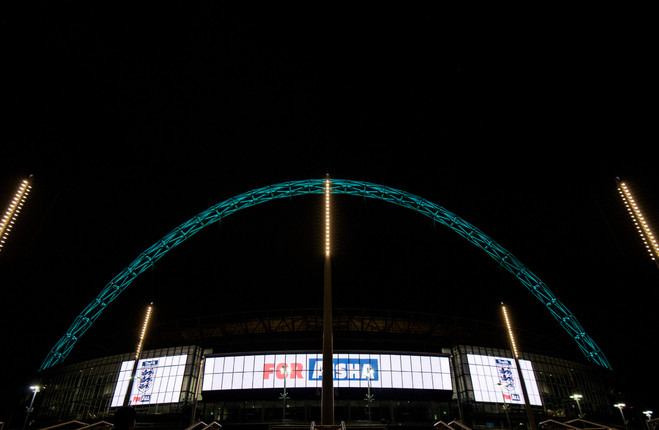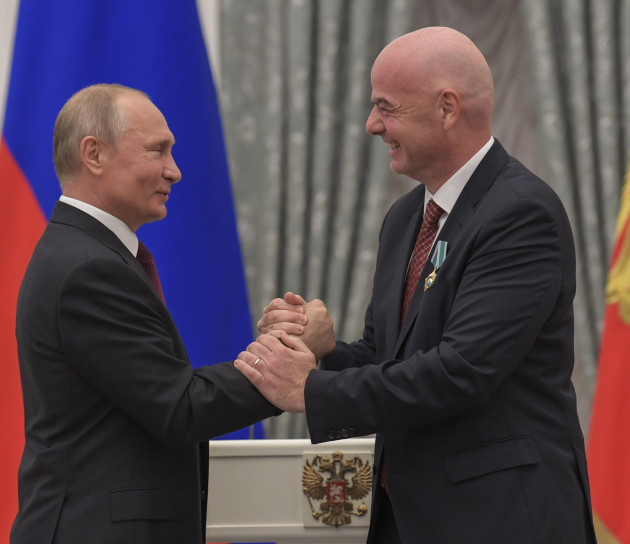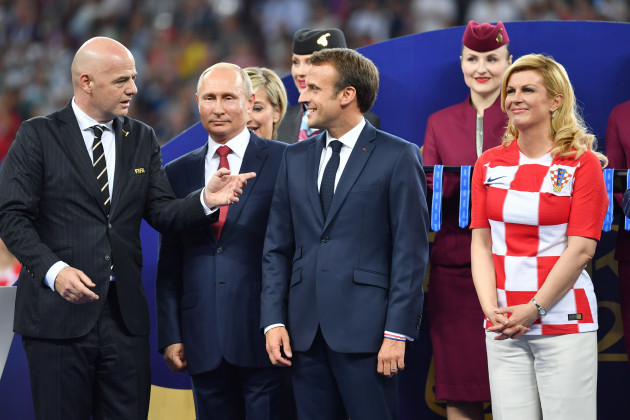THE UK INDEPENDENT today reports that the Carabao Cup final between Liverpool and Chelsea will feature the Wembley arch lit in yellow and blue, in a solemn gesture in solidarity with the people of Ukraine.
Nothing could better depict the doublethink involved in following elite football nowadays: a match sending a message of support to the people of Ukraine involving a side bankrolled by a Russian oligarch with “links to the Russian state”, as Labour MP Chris Bryant yesterday told the House of Commons.
Bryant advocated for Roman Abramovich to be stripped of his ownership of Chelsea. though there seems little political will do so among the UK government.
The same government, though, are reported to be strongly in favour of lighting the Wembley arch to send a message to the world. No surprise, perhaps, given the fact Boris Johnson is originally a newspaper columnist and his discipline is the depicting of largely powerless messages instead of doing any actual work.
That is not to say the gesture won’t be earnestly felt by everyone at Wembley, but football is filled with honourable and empathetic people working in an utterly amoral industry whose desperate embrace of huge finance has made laughably hollow the values of equality, decency and respect it espouses.
The pandemic has shown top-level football has made itself immune to financial bankruptcy, but the game foreclosed on its morals years ago.
Uefa and Fifa have both played played their roles in softening the image of Vladimir Putin in recent years, and perhaps even the leader of the latter body might some day come to regret the extent to which he has pandered to him.
In recent years we have seen Fifa president Gianni Infantino gurn in photos with Donald Trump, participate in a ceremonial sword dance while praising the “amazing scenery” and “incredible history” of Saudi Arabia for an official, state-funded promotional video, and accept an Order of Friendship medal from Putin in 2019.
Some say Infantino keeps his head shaved for aerodynamic purposes, better allowing him to crawl into the sphincter of the most powerful man in whatever room he finds himself in.
“You welcomed the world as friends, and the world has created bonds of friendship with Russia that will last forever”, said Infantino in a televised address from the Kremlin on receipt of his medal in 2019, and in reference to the 2018 World Cup. Putin is by no account a big football fan, but attending the final in Moscow helped to soften his global image, portraying him as just another national leader standing by another two, Macron of France and Grabar-Kitarović of Croatia.
Russia were awarded that tournament before Infantino became Fifa president but they retained it under his watch in spite of the annexation of Crimea in 2014. Instead, in a bleakly comic turn, Fifa disbanded their anti-racism taskforce in September 2016, declaring that they had “completely fulfilled its temporary mission.”
AP journalist Rob Harris yesterday asked Infantino if he was going to keep the medal Putin gave him, to which the Fifa president replied by not answering the question and delivering the textbook football-as-a-unifying-force pabulum instead.
“We are constantly reflecting on the role of sport, particularly the role of sport in trying to bring people together in a peaceful environment. Even people and countries who don’t have relations or are in a conflict with each other. This is a constant in our thinking.”
Infantino was back in Russia last August, with Moscow awarded the rights to host the Beach Soccer World Cup.
“Thank you, dear President Putin for your leadership and personal commitment”, blathered Infantino, “and thank you to the Football Union of Russia, to President [Alexander] Dyukov and your team for your dedication and hard work in these challenging times, to ensure this Fifa Beach Soccer World Cup will be an unforgettable event for Russia and for the world.”
So unforgettable that I’ll let you try and remember who won it.
Uefa, meanwhile, have had their own entanglements with Russia. The aforementioned Alexander Dyukov is also the CEO of the state’s gas company, Gazprom, which is a major Uefa sponsor. To accentuate those entanglements: Dyukov is also a member of Uefa’s powerful Executive Committee, the body which today decided to move the 2022 Champions League final away from the Gazprom Arena in St Petersburg.
The pandemic has shown Uefa it is relatively straightforward to move major games at short notice, but much trickier is what happens now with the Gazprom sponsorship. The company are a major Uefa sponsor – to the tune of a reported €40 million a year – and their patronage extends beyond the Champions League to less media-exposed competitions like Uefa’s biggest futsal competition.
Professor Simon Chadwick is an expert in sport’s intersection with geopolitics and major sponsorship, and he spoke on the Gazprom sponsorship on today’s OTBAM.
Partly the deal was about Gazprom legitimising itself”, he said, “and what Gazprom has also done is use Champions League games, and the corporate boxes at places like Old Trafford and Anfield to engage in what I call ‘fast-track diplomacy’, to target politicians, businesses and important decision-makers that Gazprom needed to sell gas to and also to further its political agenda.”
Uefa needs money and there is nothing morally wrong with Uefa having money. It funds many commendable football programmes throughout every country in Europe, and the FAI were grateful for the size of Uefa’s reserves when they teetered on insolvency in 2019.
Nor do Uefa operate in a vacuum, and their taking finding money from Gazprom is a necessary bulwark against the challenges of Fifa – whose biennial World Cup is a thinly-veiled power-grab – and the superclubs, an insanely wealthy coalition funded by nation states and huge investment funds battling to deny Uefa their founding right to organise football in Europe.
In the latter we see the results of allowing football be flooded by enormous sums of money of any provenance. In football, unethical money begets unethical money.
Reports today claim Uefa are taking legal advice with a view to ending the Gazprom sponsorship, which would be a progressive step and go a little way to atoning for taking the money in the first place.
If the deal isn’t ended it will raise questions closer to home, as the FAI and Irish government are currently supporting a bid for a Uefa football tournament part-sponsored by the Russian state.
This weekend the players and fans will pause in earnest support, but all the while their sport’s tainted money doesn’t just talk, it swears.
Premier League fixtures (KO 3pm unless stated)
Friday
Southampton vs Norwich (8pm)
Saturday
Leeds vs Spurs (12.30pm)
Brentford vs Newcastle
Crystal Palace vs Burnley
Brighton vs Aston Villa
Man United vs Watford
Everton vs Man City (5.30pm)
Sunday
West Ham vs Wolves (2pm)
Carabao Cup Final
Chelsea vs Liverpool (Sunday, 4.30pm)




